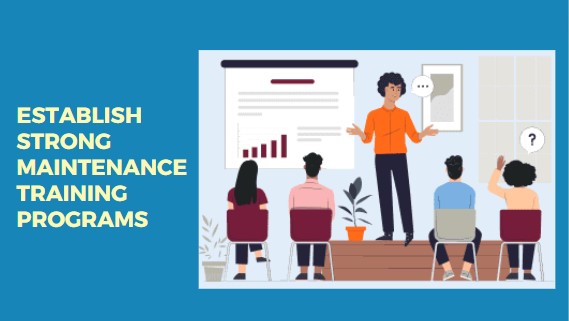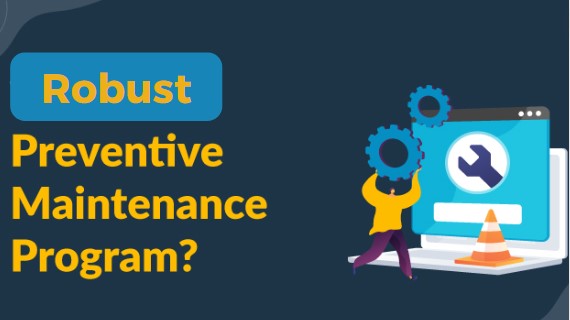
5 Ways to Establish Strong Maintenance Training Programs
Viki Dongare |
10 Mar 2024 |
13:14 PM
- Understanding the Importance of Maintenance Training Programs
- About Maintenance Training
- Different Forms of Maintenance Training
- Basic Steps for Setting Up a Maintenance Training Program
- Plan and Conduct the Training
- Try to Gauge the Efficacy of Maintenance Training
- How Proptor Facilitates Maintenance Training
- Conclusion

Implementing a Robust Preventive Maintenance Program
Madhurima Sanyal 15 Mar 2024 | 11:26 AMDiscover the key steps to build a robust preventive maintenance program, including identifying maintenance needs, setting performance targets, creating schedules, leveraging technology, training teams, establishing procedures, and monitoring progress...
Understanding the Importance of Maintenance Training Programs
Maintenance training program is integral to ensuring the effectiveness and efficiency of maintenance and reliability personnel. These programs provide essential training materials and strategic processes to equip staff with the necessary skills and knowledge to perform their job tasks effectively. By investing in comprehensive maintenance training efforts, organizations can enhance their maintenance processes, minimize downtime, and optimize asset performance.
Qualified maintenance training organizations play a crucial role in delivering high-quality training programs tailored to the specific needs of the workforce. In this article, we explore the importance of maintenance training programs and their impact on organizational success.
About Maintenance Training
Exploring the Advantages of Well-Executed Maintenance Training Programs
Effective maintenance training program offer numerous advantages, including improved equipment reliability, reduced downtime, enhanced safety, and increased operational efficiency. By providing personnel with the necessary skills and knowledge, organizations can optimize asset performance and minimize maintenance costs.
Basic Elements of an Industrial Maintenance Training Program
An effective industrial maintenance training program typically includes elements such as job task analysis, development of training materials, implementation of training processes, and evaluation of training effectiveness. These elements ensure that personnel receive comprehensive and targeted training aligned with organizational objectives.
Essential Features for Developing Effective Training Programs
To develop an objective maintenance training program, organizations should focus on incorporating features such as strategic planning, alignment with organizational goals, use of qualified training organizations, utilization of computerized maintenance management system (CMMS), and consideration of future training program funding. By incorporating these essential features, organizations can establish robust and successful training program that drive success.
Different Forms of Maintenance Training
Overview of Various Training Methods and Approaches
Effective training program comes in various forms, each offering unique advantages and opportunities for skill development. Let's explore different training methods and approaches commonly utilized in maintenance training programs.
-
On-the-Job (OJT) Training - On-the-job training involves hands-on learning experiences within the workplace environment. This form of training allows maintenance and reliability personnel to learn directly from experienced colleagues while performing their job tasks. OJT training is highly effective for practical skill development and real-time problem-solving
-
Schools and Colleges - Many educational institutions offer formal maintenance training programs, ranging from certificate courses to degree programs. These programs provide theoretical knowledge and practical skills through classroom instruction, laboratory exercises, and simulated scenarios. Formal education from schools and colleges is valuable for individuals seeking comprehensive training in maintenance practices.
-
Workshops - Workshops are intensive training sessions focused on specific maintenance topics or skills. Conducted by qualified instructors, workshops typically include hands-on activities, group discussions, and case studies to enhance learning. Workshops offer a practical and interactive approach to skill development, making them ideal for targeted training needs.
-
Online Maintenance Training Courses - Online programs provide flexibility and accessibility for learners, allowing them to access training materials and resources from anywhere with an internet connection. These programs often utilize multimedia resources, interactive modules, and self-paced learning formats to engage learners effectively.
-
AR and VR Maintenance Training - Augmented reality (AR) and virtual reality (VR) technologies are revolutionizing maintenance training by providing immersive and interactive learning experiences. AR and VR maintenance training simulations allow personnel to practice complex tasks in a virtual environment, enhancing retention and skill mastery.

-
Virtual Training -Virtual training platforms facilitate remote learning and collaboration among maintenance professionals. Through virtual classrooms, webinars, and interactive sessions, participants can engage with instructors and peers, share knowledge, and enhance their skills without geographical limitations.
Basic Steps for Setting Up a Maintenance Training Program
Step-by-Step Guide to Establishing Effective Maintenance Training Programs - Establishing an effective maintenance training program requires careful planning and implementation. Here's a step-by-step guide to help organizations set up successful training initiatives:
Conduct a Skills Assessment: Start by employee skills analysis and competencies of maintenance personnel to identify areas for improvement and training needs. This step ensures that training programs are tailored to address specific skill gaps and organizational objectives.
Define Training Objectives: Clearly define the objectives and goals of the maintenance training program. Determine the critical skills and competencies that need to be developed or enhanced to support maintenance management and operational excellence.
Develop Training Materials: Create training materials and resources aligned with the defined objectives and learning outcomes. These may include instructional guides, manuals, videos, presentations, and interactive modules to facilitate effective learning.
Implement Training Process: Establish a structured training process that outlines the sequence of training activities, timelines, and responsibilities. This may involve scheduling training sessions, assigning trainers, and coordinating logistics for training events.
Document Training Events: Document actual training events, including attendance records, training assessments, and feedback from participants. This documentation helps track progress, evaluate the effectiveness of the training program, and identify areas for improvement.
Utilize Scalable Learning Management Systems: Implement a scalable learning management system (LMS) to manage and deliver training content efficiently. An LMS allows for centralized management of training materials, tracking of learner progress, and assessment of training effectiveness.
Establish Dedicated Maintenance Training Roles: Assign dedicated roles and responsibilities for overseeing and managing the maintenance training initiative. This may include appointing training coordinators, subject matter experts, and trainers to ensure the smooth execution of the training program.

Monitor and Evaluate: Continuously monitor and evaluate the effectiveness of the maintenance training program. Gather feedback from participants, conduct post-training assessments, and adjust training strategies as needed to improve outcomes.
Plan and Conduct the Training
To ensure the success of your maintenance training program, it's essential to plan and execute certain training sessions effectively. Here are some strategies and best practices to consider:
Develop a Strategic Training Process: Design a strategic maintenance training process that aligns with the objectives of your organization and the specific needs of your maintenance personnel. Define clear learning objectives and outcomes to guide the training sessions.
Utilize a Scalable Learning Management System (LMS): Implement a scalable LMS to streamline the delivery of training content and manage the training process efficiently. An LMS allows you to organize training materials, track learner progress, and assess training effectiveness.
Engage Learners with Interactive Content: Create engaging and interactive training materials to capture the interest of maintenance personnel. Incorporate multimedia elements, simulations, and real-life scenarios to enhance learning and retention.
Document Training Events: Document actual training events, including attendance records, training assessments, and feedback from participants. This documentation helps track progress, evaluate the effectiveness of the training program, and identify areas for improvement.
Assign Dedicated Training Roles: Assign dedicated roles and responsibilities for overseeing and managing the maintenance training initiative. This may include training coordinators, subject matter experts, and trainers who are responsible for planning, executing, and evaluating training sessions.
Try to Gauge the Efficacy of Maintenance Training
Evaluate the effectiveness of maintenance training programs by collecting feedback and analyzing training outcomes. Conduct skills assessments before and after training sessions to measure progress. Document actual training events and utilize a scalable learning management system for efficient tracking. Adopting training metrics aligned with maintenance objectives and seek feedback from personnel. By implementing these methods, organizations can ensure their training initiatives contribute to successful maintenance management and the development of critical skills among maintenance personnel.
The Problem
One of the challenges faced by organizations in maintenance management is effectively gauging the efficacy of maintenance training programs. Without proper assessment mechanisms in place, it can be difficult to determine whether the training efforts are achieving the desired outcomes and contributing to improved performance.
The Solution
To address this challenge, organizations should implement a comprehensive evaluation process to gauge the efficacy of their maintenance training programs. This process involves several key steps:
-
Conduct Skills Assessment:
Before and after training sessions, conduct skills assessments to measure the knowledge, competencies, and capabilities of maintenance personnel. This helps identify areas of improvement and track progress over time.
-
Document Training Events:
Document actual training events, including attendance records, training assessments, and feedback from participants. This documentation provides valuable insights into the effectiveness of the training program and helps identify areas for improvement.
-
Utilize a Scalable Learning Management System (LMS):
Implement a scalable LMS to manage and track training activities efficiently. An LMS allows organizations to monitor learner progress, assess training effectiveness, and generate reports for analysis.
-
Measure Performance Metrics:

Establish performance metrics aligned with the objectives of the maintenance training program. These metrics may include reduced downtime, improved equipment reliability, increased productivity, and enhanced safety compliance.
-
Seek Feedback:
Gather feedback from maintenance personnel, trainers, and supervisors to assess the overall satisfaction with the training program and identify areas for improvement.
How Proptor Facilitates Maintenance Training
Overview of Proptor's Solutions for Planning, Execution, and Evaluation
Proptor offers comprehensive solutions for planning, executing, and evaluating maintenance training programs, ensuring consistent and effective training for maintenance technicians.
In the Planning Phase - Collaborating with Proptor to Design Customized Training Solutions
Collaborating with Proptor enables organizations to design customized training solutions tailored to their specific needs and objectives. Proptor works closely with maintenance leadership personnel to identify required future training, conduct employee skills assessment, and develop targeted training programs. By leveraging Proptor's expertise in training coordination and vendor qualification, organizations can ensure that their training initiatives align with industry standards and best practices.
In the Execution Phase - Maximizing Training Impact Through Proptor's Features and Functionality
Proptor's features and functionality maximize training impact by providing access to a wide range of training resources, including on-the-job training materials, training course, and safety training modules. Proptor's scalable learning management system enables organizations to store training materials, track employee progress, and monitor site training-related metrics in real-time. With Proptor, organizations can adopt training metrics and develop lifelong skills among their maintenance technicians, enhancing operational efficiency and equipment reliability.
In the Post-Training Phase - Leveraging Proptor's Post-Training Support Services for Continued Learning
Proptor offers post-training support services to facilitate ongoing learning and development. Organizations can leverage Proptor's expertise in conducting skills assessments, identifying skills deficiencies, and offering specific future training recommendations. By adopting Proptor's training coordination services, organizations can ensure that their maintenance training programs remain relevant and effective in addressing the evolving needs of the industrial and manufacturing community.
Proptor provides end-to-end solutions for targeted and effective training, from planning and execution to post-training support. By collaborating with Proptor, organizations can enhance the skills and capabilities of their maintenance technicians, maintain critical equipment, and drive operational excellence in the workplace.
Conclusion
Establishing strong maintenance training programs is essential for enhancing the effectiveness and efficiency of maintenance and reliability personnel. These programs provide vital training materials and strategic processes to equip staff with the necessary skills and knowledge to perform their job tasks effectively. By investing in comprehensive maintenance training efforts, organizations can optimize asset performance, minimize downtime, and improve operational efficiency.
Qualified maintenance training organizations play a crucial role in delivering high-quality training programs tailored to the specific needs of the workforce. Through a combination of on-the-job training, formal education, workshops, online courses, and emerging technologies such as augmented reality and virtual reality, maintenance managers can acquire the skills needed to excel in their roles.
Setting up a maintenance training program involves several key steps, including making the case for the program, creating a systematic syllabus, planning and conducting the training, gauging the efficacy of training efforts, and having plans in place for the post-training stage. By following these steps and incorporating essential features such as strategic planning, alignment with organizational goals, and utilization of scalable learning management systems, organizations can establish robust training programs that drive success.
Proptor offers comprehensive solutions for planning, executing, and evaluating maintenance training programs, facilitating ongoing learning and development among maintenance personnel. By collaborating with Proptor, organizations can ensure that their training initiatives remain relevant and effective in addressing the evolving needs of the industrial and manufacturing community.
By prioritizing training initiatives and leveraging advanced technologies and resources, organizations can empower their maintenance personnel to maintain critical equipment, drive operational excellence, and achieve long-term success.